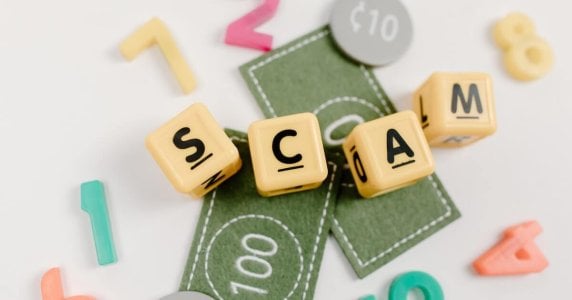Beware! The rise of inheritance scams prompts urgent warning
- Replies 9
Here at the SDC, we believe that awareness is key. Nowhere is that more important than when it comes to scams.
Unfortunately, the number of scams out there is forever increasing. And now an Australian consumer watchdog has something new to issue a warning about—inheritance scams.
Technology has opened up a world of convenience for many. But alongside these advancements are scammers trying to take advantage of people and dupe them out of their hard-earned money.
And one particularly nasty category of fraud, destruction scams, comes in the form of unexpected letters postmarked from overseas.
Consumer watchdog Scamwatch has issued an urgent alert for all Aussies to watch out for these letters, which purport to be from a law firm and appear to be promoting people to claim a deceased person's life insurance.
These letters, in particular, are looming large in the minds of the authorities, who have strongly advised everyone to be wary of any communication coming from overseas as these may be the efforts of scammers impersonating lawyers, bankers and foreign officials.
‘You will lose time and money chasing money that doesn’t exist,’ Scamwatch stated.
‘The scammer asks you to pay a fee or to give your financial or identity details so you can get the money or winnings. There is no free money, and you will lose more money trying to get it,’ it said in its warning.
According to authorities, inheritance scams are often elaborate, with outrageous claims of unclaimed inheritance from a distant relative or wealthy person, complete with bogus bank statements, documents and more.
What is the scammers’ goal? It’s always to obtain personal information and, of course, money by asking for various fees, charges and taxes.
Scammers may also send a court order claiming someone is a beneficiary and ask the recipient for their personal information or money in the hopes of making a claim.
But fake inheritance letters aren’t the only way scammers use to take advantage of you. A couple of months ago, 54-year-old Sharon Watkins became the victim of an elaborate hoax after answering a call from an unknown number.
According to Ms Watkins, she had signed up for the streaming service but wasn’t using it. The medical receptionist responded to the recorded message and agreed to speak to somebody who said they were from Amazon to cancel the account and avoid the charge.
In a short time, Ms Watkins, who lives in the rural community of Woomelang, found herself scammed out of her entire savings of $30,000, left to her by her late mother. You can read the rest of the story here.
 So, dear members, we implore you to stay alert, stay informed and don't hesitate to report suspicious activities. Remember, if something sounds too good to be true, it most likely is.
So, dear members, we implore you to stay alert, stay informed and don't hesitate to report suspicious activities. Remember, if something sounds too good to be true, it most likely is.
Have you encountered suspicious letters or messages lately? Share your experiences with us in the comments!
Unfortunately, the number of scams out there is forever increasing. And now an Australian consumer watchdog has something new to issue a warning about—inheritance scams.
Technology has opened up a world of convenience for many. But alongside these advancements are scammers trying to take advantage of people and dupe them out of their hard-earned money.
And one particularly nasty category of fraud, destruction scams, comes in the form of unexpected letters postmarked from overseas.
Consumer watchdog Scamwatch has issued an urgent alert for all Aussies to watch out for these letters, which purport to be from a law firm and appear to be promoting people to claim a deceased person's life insurance.
These letters, in particular, are looming large in the minds of the authorities, who have strongly advised everyone to be wary of any communication coming from overseas as these may be the efforts of scammers impersonating lawyers, bankers and foreign officials.
‘You will lose time and money chasing money that doesn’t exist,’ Scamwatch stated.
‘The scammer asks you to pay a fee or to give your financial or identity details so you can get the money or winnings. There is no free money, and you will lose more money trying to get it,’ it said in its warning.
According to authorities, inheritance scams are often elaborate, with outrageous claims of unclaimed inheritance from a distant relative or wealthy person, complete with bogus bank statements, documents and more.
What is the scammers’ goal? It’s always to obtain personal information and, of course, money by asking for various fees, charges and taxes.
Scammers may also send a court order claiming someone is a beneficiary and ask the recipient for their personal information or money in the hopes of making a claim.
But fake inheritance letters aren’t the only way scammers use to take advantage of you. A couple of months ago, 54-year-old Sharon Watkins became the victim of an elaborate hoax after answering a call from an unknown number.
According to Ms Watkins, she had signed up for the streaming service but wasn’t using it. The medical receptionist responded to the recorded message and agreed to speak to somebody who said they were from Amazon to cancel the account and avoid the charge.
In a short time, Ms Watkins, who lives in the rural community of Woomelang, found herself scammed out of her entire savings of $30,000, left to her by her late mother. You can read the rest of the story here.
Key Takeaways
- Australia’s consumer watchdog Scamwatch has warned about the rise in inheritance scams.
- Consumers are advised to be vigilant of unexpected overseas letters, often imposed by fake law firms, encouraging recipients to claim a deceased person’s life insurance.
- Scamwatch informs the public that these scams are often sophisticated, including fake bank statements and other bogus documents.
- The watchdog asserted that there is no such thing as ‘free money’ coming from unexpected communications, and individuals will lose more trying to claim it.
Have you encountered suspicious letters or messages lately? Share your experiences with us in the comments!









